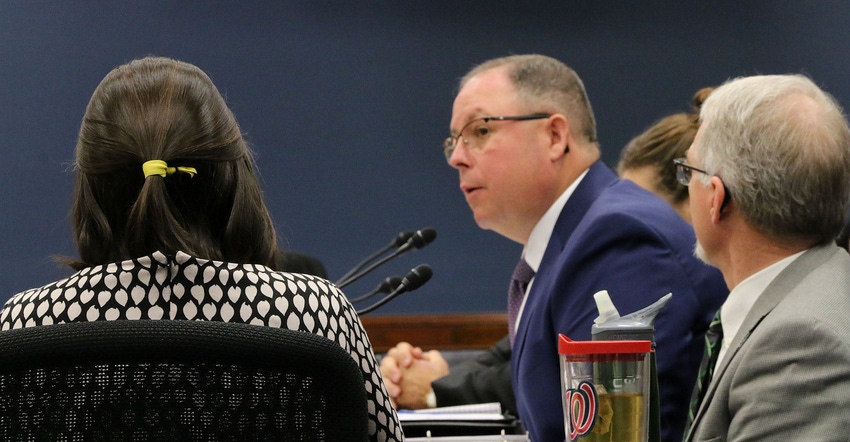Overregulation, capital access and estate tax pose challenges to small and beginning farmers.
March 24, 2017

Small family farmers told the House Small Business Committee’s subcommittee on agriculture, energy and trade Thursday that capital access restrictions, the death tax and overregulation pose significant challenges to the future of America’s family farms.
“Small farms have always been a part of our nation’s fabric, and it cannot be stressed enough that the small family farm is a small family business,” subcommittee chairman Rod Blum (R., Iowa) said. “Although the industry has changed over time, agriculture is still a force pushing America’s economy forward. Forty-one percent of all land in the United States is used for farming. U.S. agriculture has a $45 billion trade surplus with other countries, and while it may be surprising, over 93% of America’s farms are small family farms.
“In addition to low prices, small family farms have a multitude of other issues to worry about. From high taxes, increasing regulatory burdens and trouble selling their products internationally, it seems like government bureaucracy is only making it harder to run a small farm,” added Blum, who was leading his first hearing as the subcommittee’s new chairman.
Regulatory overreach
“Our biggest concern is overregulation,” testified Tim White, the owner of White Farm LLC in Lexington, Ky. He said the Environmental Protection Agency’s "waters of the U.S." (WOTUS) rule is a prime example of overregulation that would subject farmers and ranchers to an unnecessary and costly permitting process.
Producers pride themselves on being good stewards of the country’s natural resources. “We maintain open spaces, healthy rangelands, provide wildlife habitat and feed the world, but to provide all these important functions, we must be able to operate without excessive federal burdens, like the WOTUS rule," added White, who testified on behalf of the National Cattlemen’s Beef Assn. "As a small business owner, I am particularly concerned with the lack of outreach to the small business community by federal agencies such as EPA.”
White continued that, knowing the detrimental impact this regulation could have on his family-owned operation, it is "appalling" to him that agencies could assert that the WOTUS rule would not have a significant economic impact on small businesses.
“It is clear to me that the rule’s primary impact would do just that. There was no outreach to us in the agriculture community before the rule was proposed. There wasn’t a meaningful dialogue with the small business community as a whole, and because of that, what we got was a WOTUS rule that doesn’t work for small businesses and doesn’t work for animal agriculture,” White said.
The positive news is that President Donald Trump signed an executive order requiring EPA to go back and revise the WOTUS rule.
Broken tax cod
Sarah Rickelman, manager of Degener-Juhl Farms in Hudson, Iowa, noted that another way actions taken in Washington, D.C., affect family farms "is through current tax policy. As Congress looks to reform our nation’s tax policy, I hope that lawmakers will consider the impact any change will have on the thousands of family farms across the country. While lowering individual tax rates is a positive reform, family farmers will ultimately pay more taxes if essential tax policies for small businesses are eliminated."
Rickelman, who testified on behalf of the Iowa Farm Bureau, explained that agriculture is a capital-intensive business, so being able to deduct business expenses is a critical tool, and this should include the ability to deduct interest expenses. “As a young farmer, I’m extremely concerned about the ability of the next generation to purchase their first piece of ground or expand their operation if they can’t deduct interest expense. A tax reform package that doesn’t include these provisions will ultimately increase taxes on family farms.”
Rickelman and White also advocated for permanent elimination of the death tax while maintaining a stepped-up basis. These tax provisions are essential to the survival of the family farm, they noted.
The American Taxpayer Relief Act of 2012 permanently extended the estate tax exemption level to $5 million per person or $10 million per couple. White said while the agriculture industry is "grateful" for this bill, "the current state of our economy has left many agricultural producers guessing about their ability to plan for estate tax liabilities.”
Future farmer support
Farm income is directed toward more than just supporting the household, according to Dr. John Lawrence, associate dean and director for extension and outreach at Iowa State University’s College of Agriculture & Life Sciences.
“Farmers reinvest profits back into the farm operation by purchasing or improving land, machinery and facilities," he explained. "It may be cash payments or financed purchases with annual loan service payments. The decision between family living expenses and investment in the farm is a balancing act as old as farming itself. If a family farm is going to sustain itself into the future, it must maintain its assets, whether they be physical or in support of the family.”
Lawrence added that family farms face many challenges to sustain the farm business from one generation to the next. One challenge is managing a business in a globally competitive industry like agriculture while dealing with variable weather and markets, evolving technology, regulations and narrow margins.
A second challenge is to grow a business that can support a family — and, for some farms, a business that can support two or more families as the operation is transitioned from one generation to the next.
Third, and often the most difficult challenge, is the communication and planning necessary within the family about the future of their farm business, Lawrence testified.
You May Also Like


.png?width=300&auto=webp&quality=80&disable=upscale)
